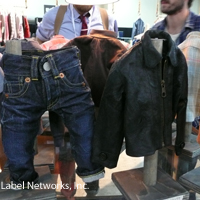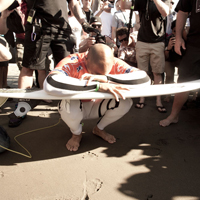
Though American Apparel’s stock did rally 16% on Friday, October 1st, at the news that its lender Lion Capital, gave the vertically-integrated LA brand more time with an amended loan program, it’s still unclear if American Apparel can reclaim the behemoth leading title it once had.
For youth culture fashion, American Apparel has paved new ways starting first with taking first-layer pieces and blanks, or as they describe it, “branded fashion basics” such as T-shirts, and elevating the importance and styles of such pieces to the point where the brand and retailer is often listed in our Youth Culture Studies as one of the favorites among 13-25-year-olds. Over the years, American Apparel T-shirts were noted as the best “blanks” to print your own brand’s graphics on, thus creating a demand for the brand from other brands. This process has continued to stun the fashion industry, especially others within the fashion basics marketplace such as Hanes and Fruit of the Loom, when they quickly became not only a popular brand, but leaders in creating new silhouettes, fabrics, trend-setting styles, and provocative yet popular ad campaigns.
As a quick recap, American Apparel is a vertically integrated manufacturer based out of Los Angeles. This means that they manufacture and distribute right in the same facility, providing them with advantages of being ahead of trends with fresh styles produced in a timely manner, quick distribution, and lower costs for distribution because they’re made in the USA (which has also tapped into the growing importance of “Made in America”). American Apparel is also one brand that continues to be a strong favorite among youth culture, and has literally launched the blank-branded movement that so many other brands now try to follow. The trajectory of preferences for American Apparel, the brand, and store, among 13-25-year-olds in North America and Europe, as reported in our Global Youth Culture Studies, continues to show that there is innovation and market opportunity in some of the most obvious of places -fashion basics.
However with expansion, which it appears now may have been too fast, has come a slew of challenges, including the brands latest by missing its second quarterly report (which has been rescheduled with the NYSE for November 15, 2010), and cash flow problems.
“Lion Capital has enormous admiration for both American Apparel and its founder, Dov Charney,” said Lyndon Lea, Founder and Partner of Lion Capital. “We are working together with Dov to realign the capital structure of American Apparel to support a number of key initiatives within the business, including the hiring of several new senior executives. We wholeheartedly support the company’s ‘Made in USA’ philosophy under which 7,000 industrial workers in downtown Los Angeles are paid a fair wage. We are particularly impressed by Dov’s passion and energy, and have complete confidence in the American Apparel brand and its business model as an integrated manufacturer and retailer.”
“We are grateful for this expression of continued support for American Apparel’s mission by Lion Capital,” said Dov Charney, Chairman, CEO and founder of American Apparel. “I am touched that Lion Capital is sensitive to the unique challenges that the company has faced in the past year. We look forward to continuing to work closely with Lyndon and Lion Capital over the next several years as we work to build a great future for American Apparel.”
On the horizon to their new future is a new executive team which the fashion industry is eagerly awaiting to hear about. The turn-around of such a brand will have significant effects on youth culture fashion. Without American Apparel, in essence, there would be a significant hole in the basics industry and present opportunities for others to fill this gap -which some brands are already attempting to do such as “the same guy,” created by Christian Audgier, formerly from Ed Hardy, Three Dots, Alternative Apparel, and several other eco-friendly basics brands.
Charney, who has stated that he does not plan to declare bankruptcy, continues to be in the headlines however for many reasons, including his lascivious marketing and advertising campaigns, and his stance of immigration and workers rights in America. There’s also a lawsuit going on with some shareholders who claim they were misled about American Apparel’s financial stability, as shares have dropped some 66% in this year. However Charney still holds a controlling interest of 53%, along with Ron Burke, a billionaire who owns another 6%.
Stay tuned as we continue to report on the fate of American Apparel as news develops.


